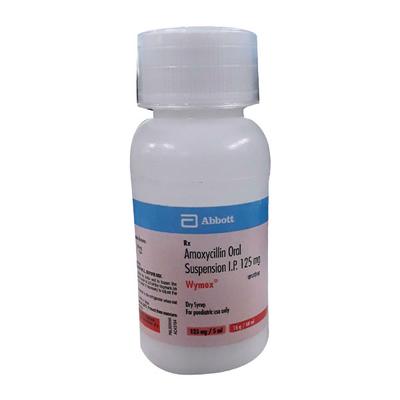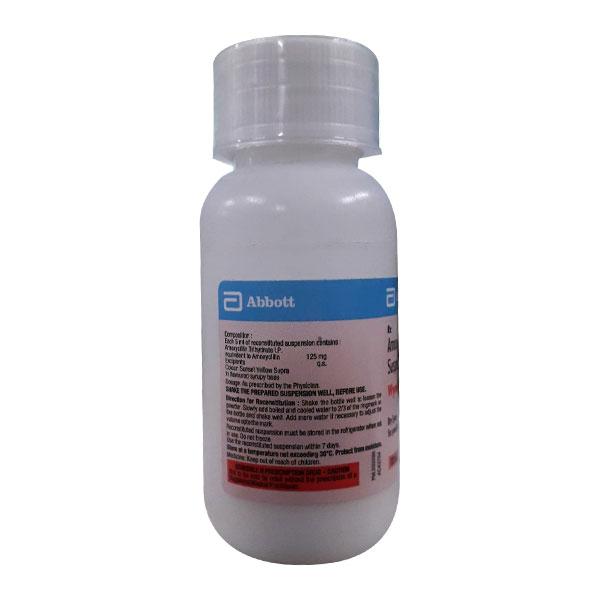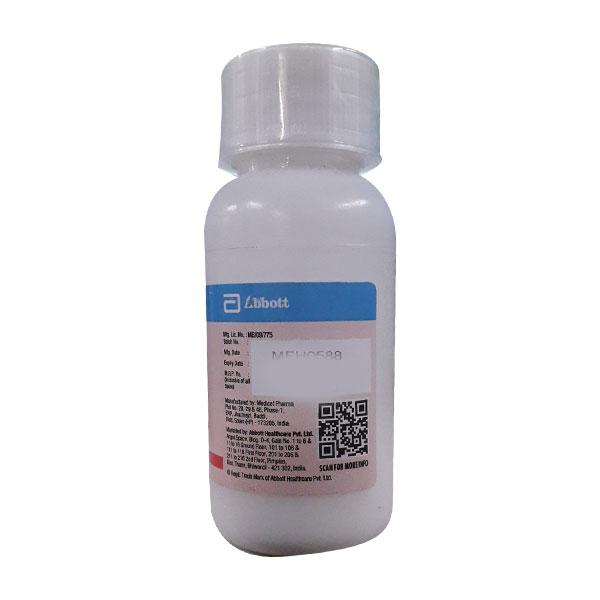

Netmeds First Membership
Quick Links
Introduction About WYMOX DRY SYRUP
WYMOX DRY SYRUP is an antibiotic medicine used in the management of various bacterial infections such as respiratory tract infections, ear, nose, throat infections, stomach infections (H. Pylori infection), skin infections and urinary tract infections, especially in children. It contains a medicine called amoxycillin which is a powerful antibacterial agent that eradicates the susceptible microorganism that causes the infection.
Do not take WYMOX DRY SYRUP if you are allergic to Amoxycillin. Before taking WYMOX DRY SYRUP inform your doctor if you have kidney problems, glandular fever, urinary problems, etc. Consult your doctor before taking WYMOX DRY SYRUP if you are pregnant or breastfeeding.
The most common side effects of taking WYMOX DRY SYRUP are nausea, diarrhea and skin rashes. Consult your doctor if they trouble you.
Uses Of WYMOX DRY SYRUP
Management of bacterial infections such as:
- Respiratory tract infections
- Ear, nose, throat infections
- Stomach infections (H. Pylori infection)
- Skin infections
- Urinary tract infections
How WYMOX DRY SYRUP Works
WYMOX DRY SYRUP contains a medicine called Amoxicillin which is a type of antibiotic that belongs to the penicillin group. It works by inhibiting the synthesis of bacterial cell walls. Bacteria have a protective outer layer called the cell wall, which is essential for their survival. Amoxicillin interferes with the enzymes that are responsible for forming the cell wall, specifically targeting the cross-linking process. This weakens the cell wall, causing it to rupture and ultimately leading to the death of the bacteria. This action makes amoxicillin effective against a wide range of bacterial infections.
How to use WYMOX DRY SYRUP
Take WYMOX DRY SYRUP as advised by the physician.
For Dry Syrup: Shake the medicine powder for dispersing the powder. Add the sterile water provided along with the package into the dry powder and shake it vigorously for 10-15 mins. Measure the required amount of the medicine in the measuring cup and drink it. Store the reconstituted mixture in refrigerator
For Syrups and Suspension: Shake the medicine well before use. Measure the required quantity of the medicine in the measuring cup provided with the package and drink it immediately.
Your doctor will decide the correct dose and duration of the therapy based on your age, body weight and severity of infection.
Side Effects Of WYMOX DRY SYRUP
Common
- Nausea
- Diarrhea
- Skin rashes
Uncommon
- Vomiting
Stop taking WYMOX DRY SYRUP and contact your doctor immediately if you experience any of the following side effects:
- Allergic reactions (such as skin rashes, itching, swelling of the face, lips, tongue, causing breathing difficulties)
- Skin rash or pinpoint flat red round spots under the skin surface or skin bruising, inflammation of blood vessel walls due to an allergic reaction with or without joint pain (arthritis) and kidney problems
- enlargement of the lymph nodes especially under the arms
- fever, chills, headache, skin rashes, itchy reddish-purple patches on the skin especially on the palms of the hands or soles of the feet, changes in skin colour, bumps under the skin, blistering, pustules, peeling, redness, pain, itching, scaling.
- inflammation of the large bowel (colon) with diarrhoea (sometimes containing blood), pain and fever
- severe diarrhoea with bleeding and blisters, redness or bruising of the skin − darker urine or paler stools − yellowing of the skin or the whites of the eyes (jaundice)
How To Manage Side Effects
Nausea And Vomiting
To manage nausea caused by antibiotics, it's important to take the medication with food unless otherwise directed by your doctor, as this can help reduce stomach irritation. Drinking plenty of water and staying hydrated can also alleviate nausea. Eating small, frequent meals and avoiding spicy or greasy foods may further help. If nausea persists, ginger or peppermint tea can be soothing. In some cases, your doctor might recommend taking the antibiotic with a probiotic to maintain gut health. Always consult your healthcare provider if nausea becomes severe or interferes with your ability to take the medication.
Warning & Precautions
Pregnancy
Use with CautionWYMOX DRY SYRUP should be used with caution in pregnant women. Therefore, consult your doctor for advice before taking it.
Breastfeeding
Use with CautionWYMOX DRY SYRUP should be used with caution in breastfeeding women. Therefore, consult your doctor for advice before taking it.
Driving and Using Machines
Use with CautionDo not drive or operate any heavy tools or machines if your ability to concentrate is affected by WYMOX DRY SYRUP.
Kidney
Use with CautionWYMOX DRY SYRUP should be used with caution in patients with trouble urination or kidney problems. Therefore, consult your doctor for advice.
Allergy
ContraindicatedDo not take WYMOX DRY SYRUP if you are allergic to Amoxycillin or to any other ingredients of this medicine.
Others
Before taking WYMOX DRY SYRUP, inform your doctor if you:
- Are suffering from glandular fever
- Are scheduled for any blood tests or urine tests
Interactions
A. Drug-Drug interactions:
- Antigout agents (such as probenecid, allopurinol)
- Anticoagulants (such as warfarin)
- Other antibiotics (such as tetracycline)
- Methotrexate (used to manage cancer and severe psoriasis)
Overdosage:
If you or anyone else accidentally took too much of WYMOX DRY SYRUP, consult your doctor for advice or visit the nearby hospital straight away. Signs of overdosage might include stomach upset, nausea, vomiting, diarrhea, crystals in urine, cloudy urine, problems in urination.
Synopsis
| Drug | : | Amoxycillin |
| Pharmacological Category | : | Penicillin antibiotics |
| Therapeutic Indication | : | Bacterial infections |
| Dosage Forms | : | Tablet, Capsule, injection, drops, dry syrup, oral suspension, dispersible tablet |
More Information
Storage
- Keep WYMOX DRY SYRUP out of reach of children
- Store WYMOX DRY SYRUP at room temperature
FAQs About WYMOX DRY SYRUP
Q: What WYMOX DRY SYRUP is used for?
A: WYMOX DRY SYRUP is used to manage bacterial infections caused by susceptible strains of gram-positive and gram-negative bacteria (affecting different parts of the body) which is also used in combination with other medicines to manage stomach ulcers.
Q: How does WYMOX DRY SYRUP work?
A: WYMOX DRY SYRUP works by inhibiting the synthesis of penicillin-binding proteins which leads to the activation of autolytic enzymes in bacterial cell wall resulting in lysis/destruction of bacterial cell wall thus managing the spread of infection in affected children.
Q: Can WYMOX DRY SYRUP stain teeth?
A: Yes, WYMOX DRY SYRUP may stain the teeth which may occur very rarely in children. Good oral hygiene practices like brushing teeth may help to manage it. Consult your doctor if the symptom persists.
Q: What are the side effects of WYMOX DRY SYRUP?
A: The most common side effects of taking WYMOX DRY SYRUP are skin rash, nausea, and/or diarrhoea. These symptoms will subside after management. Consult your doctor if any of these symptoms worsen in the child.
Q: Can WYMOX DRY SYRUP be used in children with liver problems?
A: Yes, WYMOX DRY SYRUP can be used but with caution in children with liver problems such as hepatic impairment. Consult and inform your doctor before administering the medicine to the child.
Q: Can WYMOX DRY SYRUP interact with other medications?
A: WYMOX DRY SYRUP may interact with certain medications, including other antibiotics and anticoagulants. It's important to inform your healthcare provider about all medications your child is taking, including prescription drugs, over-the-counter medications, and dietary supplements, to avoid potential drug interactions.
Q: Can WYMOX DRY SYRUP be used for viral infections such as the common cold or flu?
A: No, WYMOX DRY SYRUP is an antibiotic medication used specifically to manage bacterial infections. It is not effective against viral infections such as the common cold or flu. Taking antibiotics unnecessarily for viral infections can contribute to antibiotic resistance and may cause unnecessary side effects.
Q: Does WYMOX DRY SYRUP cause diarrhea?
A: Yes, diarrhea is a common side effect of WYMOX DRY SYRUP. It may occur as a result of changes in the gut microbiota or as an allergic reaction to the medication. If diarrhea becomes severe or persistent, or if you notice any signs of dehydration, such as decreased urination or dizziness, consult your healthcare provider.
Q: How long does it take for WYMOX DRY SYRUP to start working?
A: The onset of action of WYMOX DRY SYRUP can vary depending on the severity and type of infection being managed. In many cases, improvement in symptoms such as fever and pain may be noticed within a few days of starting management. However, it's essential to complete the full course of antibiotics as prescribed by your healthcare provider, even if you start to feel better before the course is finished.
Q: Can WYMOX DRY SYRUP cause allergic reactions?
A: Yes, WYMOX DRY SYRUP can cause allergic reactions in some individuals, especially those with a history of allergies to penicillin or other beta-lactam antibiotics. Allergic reactions may manifest as skin rash, itching, hives, swelling, difficulty breathing, or anaphylaxis. If your child experience any signs of an allergic reaction, seek medical attention immediately.
References
1. KD. Tripathi. Essentials of Medical Pharmacology. 8th Edition. Beta Lactam Antibiotics. Page-773.
2. Amoxicillin. StatPearls. National Library of Medicine. National Center for Biotechnology Information. PMC. PubMed Central. [Revised in November 2023]. [Accessed on 13th August 2024] https://www.ncbi.nlm.nih.gov/books/NBK482250/
3. Flamingo Pharma (UK) Limited. European Medicines Compendium (EMC. UK). Amoxicillin 125 mg/5 ml Powder for Oral Suspension Sugar Free. Amoxicillin 250 mg/5 ml Powder for Oral Suspension Sugar Free. [Revised in February 2023]. [Accessed on 13th August 2024] https://www.medicines.org.uk/emc/files/pil.14146.pdf
Useful Diagnostic Tests
- Complete blood count (CBC)










